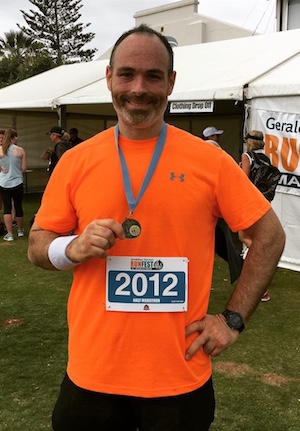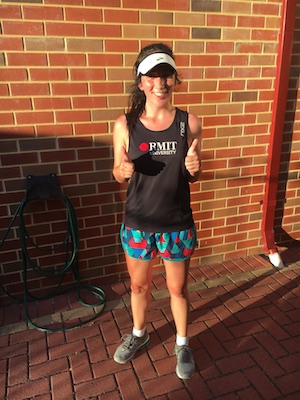12 for Twelve: Running Training & Recovery – Part 1
12 for Twelve
Running Training & Recovery – Part 1: SLEEP
Signed up to the HBF Run for a Reason since Madeleine and Bob’s last post? Congratulations, and welcome to the second blog post in the 12 for Twelve run series!
 Two of the most important, but poorly understood and often overlooked, components of successful running training recovery are sleep and nutrition.
Two of the most important, but poorly understood and often overlooked, components of successful running training recovery are sleep and nutrition.
As luck would have it, two of Madeleine and Bob’s favourite things in life just so happen to be eating and sleeping! So we thought we’d delve a bit deeper into these topics and how they relate to running over the next few weeks.
Let’s kick things off with sleep…
Sleep is probably most people’s favourite, but not always the most easily accomplished, form of recovery. Everyone understands the importance of a good night’s sleep BEFORE a big run or event, but often we forget that it’s just as important, if not MORE, after a run.
Whether you’re beginning to increase your kilometres leading up to a big event, or just seeking improvement or maintenance of general fitness, sleep is very, very important! The muscles, tendons, ligaments, bones, heart and blood vessels throughout your body are being put under stress and strain while you run, and sleep is the time for tissues to repair and strengthen. If you cheat on sleep you’re missing out on cashing in on all of your hard work, along with increasing your risk of injury and illness.
A quote from this great article by internationally renowned sleep experts, ultramarathon runner Dr Ian Dunican of Sleep 4 Performance, and former NASA and US Air Force experimental psychologist Dr John Caldwell, sums it up perfectly:
“Sleep is like the fuel in a fuel tank – what you take out must be replaced. Just like with our diets, we measure calories in/calories out over a day to maintain a consistent energy balance. Sleep is no different. If you do not fill up your sleep tank or reservoir, you decrease your probability of success and increase your probability of failure and increase personal risk because you are running out of ‘fuel.'”
Allowing yourself enough sleep is not just a matter of sleeping-in and catching up on weekends – it’s also a case of making a conscious effort to manage your bed time each evening and waking time every morning. Sleep planning, preparation and routine need to be a deliberate part of each day to ensure you achieve adequate hours of rest and subsequent recovery.
 Quality sleep is also very important and can be affected by things such as muscle and joint pains, an overstimulated nervous system, and stress. Your osteopath can help to improve your sleep quality and quantity, and – if necessary – provide hands-on treatment to help alleviate anything that may be having a detrimental effect on your ability to get some wonderful zzz’s!
Quality sleep is also very important and can be affected by things such as muscle and joint pains, an overstimulated nervous system, and stress. Your osteopath can help to improve your sleep quality and quantity, and – if necessary – provide hands-on treatment to help alleviate anything that may be having a detrimental effect on your ability to get some wonderful zzz’s!
We also have a great network of professionals we can refer to if you need help that we can’t provide. One of which is our naturopath Diane Pascoe, who is a great person to see if you’re struggling with any components of sleep.
Keep your eyes out for our next article, which will cover nutrition and its effect on running recovery and performance, in the coming weeks!
In the meantime, here’s a few links we really like that provide some great resources:
- Performance in sport. What’s the role of sleep? (Article by Dr David Cunnington at SleepHub)
- How to Get Better Sleep as a Runner (Runner’s World article)
- Sleep in…and win! (Video: TEDx Talk by Dr Ian Dunican)